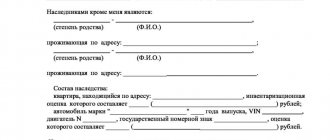Entering into an inheritance is associated not only with positive emotions from receiving property, because it means that death has overtaken a loved one from whom this inheritance came. Despite the mourning occasion, the inheritance procedure must be properly executed. Notaries will help with this. They work with applications for acceptance of inheritance so that the heir can receive a certificate of inheritance. It is the notary who will open the case, deal with the documents and perform a lot of other manipulations to ease the burden of the ordinary person. Both public and private notaries can handle inheritance cases, so when turning to a specialist, look at his experience and skills.
What can a notary do?
Inheritance is a set of measures that are aimed at certifying cases of inheritance and transfer of property to the heir. A notary is a specialist who can help resolve the legal side of the issue.
The powers of a notary in entering into an inheritance are as follows:
- can register and keep records of documents related to inheritance and the transfer of rights to it (applications, refusals, consents, certificates and certificates);
- if the inheritance is open, the notary must inform the possible heirs about the fact in question;
- documents all important facts for the case (the fact of death, the fact of the right to inheritance of individual applicants, etc.);
- may refuse to issue certificates and orders to persons who do not have the right to claim an inheritance or who cannot enter into an inheritance for some other reason.
The terms of reference are not complete. This specialist can perform other actions provided for by law, but only in the case that is in his proceedings.
Cost of notarial actions
Below is a table with prices for notary services when entering into an inheritance. The indicated price is current.
| List of notarial actions | Notary fee | Cost of legal and technical work | Total |
| Issue certificates of inheritance according to the law and the right to inheritance under a will: - for real estate - for the rest of the property -for cash deposit Note: 1) When issuing certificates of the right to inheritance, of the surviving spouse’s right of ownership to a share in the common property, all deposits and funds in all accounts, as well as rights to closed accounts in one bank, are considered one piece of property | *children, including adopted children, spouse, parents, full brothers and sisters, living separately from the testator, as well as full-born brothers and sisters: 0,3 % of the value of the inherited property, but not more than 100 thousand rubles. * to other heirs: 0,6 % of the value of the inherited property, but not more than 1 million rubles. not charged | 6000 rub. 3000 rub. 1000 rub. | |
| Issuance of a certificate of ownership of a share in the common property of spouses - for real estate - for the rest of the property | 200 rub. | 6000 rub. 4000 rub. | 6200 rub. 4200 rub. |
| Taking measures to protect inherited property, including inventory | 600 rub. | 8000 rub. | 8600 rub. |
How a notary opens inheritance cases
The death of a close relative or a person with whom you had a good relationship during life brings not only grief. If a will was left in which a person is the heir of property, after the death of the owner, he can contact a notary to open an inheritance case.
The basis for opening a case may be a document confirming the death of the owner. The heir must submit an application to the notary. It is this that becomes the impetus for opening a business. You can even submit documents where there are minor irregularities in the design. If the application was drawn up without professional support, mistakes are not uncommon. But the case will not be opened if errors and inaccuracies are not corrected in time.
After the primary documents confirming the right to inheritance have been received by the notary, they must be registered. Registration is carried out by entering data into the register of inheritance affairs. This book will contain all the materials that accompany the case.
Trust the seal
Specialists from the Center for Digital Expertise of Roskachestvo recommend avoiding both real and virtual intermediaries when contacting a notary office.
“Call the notary’s office directly, rather than communicate with a lawyer through intermediaries,” advise Roskachestvo. — Look for up-to-date and reliable information about the notary office, notarial acts and tariffs for notarial acts on the portal of the Federal Notary Chamber or on the websites of regional notary chambers. Remember that a notary provides consultations on issues of performing notarial acts free of charge.”
If you are looking for a notary on the Internet, pay attention to all the details: advertising notes, reviews of the company on the Internet, website address. Even on the first page of search results, depending on the request, scammers may appear, experts say.
“If you find yourself on the website of a notary’s office, pay attention to its design. The lack of a secure connection, a flashy style, an active solicitation of services - all these are indicators that, most likely, you are on a phishing site supposedly of a legal firm,” the recommendations say.
“Citizens’ trust in various kinds of free legal advice, which often mimic the signs of government organizations, has been killed in the bud,” says Alexander Borisov, deputy head of Roskachestvo. “But people rarely suspect that fraudsters may be hiding under the guise of a notary.” Therefore, in order to attract clients, websites with dummy pages are opened on which chatbots imitate consultants, banner advertising is created and placed on the Internet, and, of course, these websites pop up in search results. For example, for requests for free legal assistance, the positions of such fake sites on the first pages can be very high.”
Fraudsters often create websites styled like the websites of notary offices. Therefore, lawyers recommend reading the contract carefully before giving money to someone who carefully portrays an energetic professional.
Experts have named beacon phrases that should cause concern among citizens.
“Remember: “providing consulting services”, “problem assessment” and “analysis of legal ways to resolve” are formulations that do not mean anything, that is, the consumer will pay money without the assistance of specialists” who promise to draw up a marriage contract or an agreement on the division of property spouses and even wills.
It is not uncommon for citizens to come to a notary’s office with a document written by such “lawyers” in their hands, and it turns out that its contents simply contradict the provisions of the law. That is, people paid money for an illiterate document.
Entry into inheritance and timing of opening an inheritance case
The law does not have exact deadlines for when it is possible to withdraw an inheritance case from a notary, but there are other rules that control the procedure under consideration. But the case of entering into an inheritance will not open until the first document is received, on the basis of which the notary can begin the procedure. As soon as the first application is received, the notary must open the case within 1-2 days from that moment.
The period for accepting an inheritance, if you have the right to enter into it, is six months. But this does not affect the opening of the case for entry. The case can be opened both before the six-month period expires and after this happens. The main thing is to wait until the inheritance opens.
Also, the legislation does not have clear restrictions on the conduct of inheritance cases. The final deadline is the entry into the rights of all heirs who decided to receive the inheritance or their refusal of the procedure. If other heirs are discovered who have not entered into their rights, the inheritance case, which has already been closed, can be resumed while materials about it are stored. And their shelf life is more than 10 years.
Inheritance lawyer's fee in Moscow and regions
It is important to understand that the price is mainly influenced by the complexity of the case and its labor intensity, but the area in which this case is carried out does not play a special role. In Moscow, in the Central Federal District, in the Southern and Northwestern districts, the price is almost the same. Thus, for a consultation, specialists of this spectrum charge an amount in the region of a thousand rubles, for writing and legal filing a claim in the courts - about three thousand rubles, for representation in the legal process - about twenty thousand, and for the actual registration of an inheritance - starting from ten thousand. Although the latter again changes, based on what exactly needs to be contributed to the inheritance. If we talk about shares of a company or corporation, then it will be several times cheaper than if you registered real estate or land. On the Internet you can often see advertising banners that sell a range of such services for 5,000 rubles, but, in fact, this is either a scam or a common ploy on the part of PR people. Even trainees don’t work for that price. If you need to leave an inheritance, but you don’t have money, then you can sign up for a free consultation with a lawyer.
Where can I get a free consultation?
There are several ways to get a free consultation with an inheritance lawyer in Moscow:
- Online. You can find free consultants either on specialized websites or on lawyer forums, where lawyers will answer any of your questions.
- By phone. There are a huge number of lawyers answering your questions over the phone.
- Personally with a lawyer. To attract clients, lawyers conduct free consultations and then offer you a package of paid services. This is a good option.
Rating 0% (0 Votes)
What documents are required to enter into an inheritance?
To enter into an inheritance, desire alone is not enough; you need to prepare documents confirming the person’s right to the procedure in question. In addition to the application, the following documents may be required:
- a certificate confirming the death of the owner of the property, which has now become an inheritance (can be obtained from the local registry office);
- documents of title to inherited property, and documents indicating its location;
- a certificate of the place of residence of the deceased (will show who lived with him before his death);
- papers confirming relationship with the deceased;
- passport of the person who submitted the application;
- will (if there is one and valid).
Other documents may be required, but the notary will inform you about them. They can be added to the case later.
Entry into inheritance rights
After opening a case, the notary carries out a set of activities, the purpose of which is to certify the heir. As soon as the specialist receives documents on the basis of which he can open a case, he gradually begins to carry out the following procedure:
- First, it keeps records of received documents, registers them and stores them.
- The specialist must notify all persons interested in the case that an inheritance case has been opened and the possibility of obtaining a share in it.
- After the applicants appear, the notary will ask them to provide documents confirming the right to inheritance.
- Will issue a certificate of right to take over.
After this, entry documents must be stored in the database for several years.
Private property is an indicator of the well-being and stability of our citizens. A person always strives for a better life not only for himself, but also for his descendants. A prosperous society is also a stable state. And it is the state that protects the rights, interests and will of the citizen (including the will to transfer his property to someone after death), and the notary guarantees their legal execution. Consequently, the need for a notary as a guarantor of the legality of registration of inheritance rights has increased significantly in our time. When registering an inheritance, the actions of a notary are of a special nature and are associated with the legal establishment, certification, protective and jurisdictional functions of the notary. According to the Fundamentals of the legislation of the Russian Federation on notaries (Articles 1, 5,8, 9), a notary in his activities is guided by the Constitution of the Russian Federation, legislative acts of the Russian Federation, legal acts of public authorities adopted within their competence, as well as international treaties. When registering inheritance rights, the notary faces the need to establish legal facts of varying degrees of complexity. During inheritance, the rights and obligations of the deceased person are transferred to other persons, that is, universal succession (p. 1110 of the Civil Code of the Russian Federation). The fact of acceptance of an inheritance, with which the law connects the ownership of the inherited property to the heir (Article 1152 of the Civil Code of the Russian Federation), is established by a notary when accepting an application for acceptance of the inheritance or refusal of it (Article 1153 of the Civil Code of the Russian Federation), when opening an inheritance case.
A notary who has received a message about the opening of an inheritance is obliged to notify about this those heirs whose place of residence or work is known to him (Article 61 of the Fundamentals). This is necessary to establish the subject composition of the heirs. The notary establishes the identity of the heir, the presence of family relations that are the basis for calling for inheritance in accordance with the law of persons who filed an application for acceptance of the inheritance, the existence of a will, and determines the circle of persons entitled to reimbursement of expenses from the inherited property. The next fact that the notary establishes is the composition and location of the inherited property. The protective function is carried out by a notary when registering inheritance rights by taking measures to protect the inherited property, explaining to persons applying for registration of an inheritance their rights and obligations, and assisting in their implementation. When registering inheritance rights, the notary requires evidence of the death of the testator, the time and place of opening of the inheritance, the presence of family or other relationships that are the basis for calling for inheritance, checks the composition and location of the property by checking the relevant documents.
Registration of inheritance rights takes up most of a notary’s working time. After all, conducting an inheritance case is not limited to accepting applications from heirs and issuing a certificate of the right to inheritance. Collecting the necessary documents for the inheritance case, legal analysis of the collected factual material, taking measures to protect the inheritance property and decisions on the inheritance case, preparing, drawing up requests and legal analysis of the answers to them, certificates, decisions, inventory and filing of completed inheritance cases, etc. etc., that is, legal and technical work on managing inheritance cases takes a lot of time.
Only when the notary establishes that there is no dispute between the heirs, does he draw up and certify a certificate of right to inheritance, which is an official confirmation of the legal and indisputable rights of the heirs. Thus, the significance of the actions of a notary when registering an inheritance is great and multifaceted, and in some cases vitally important.
General provisions on inheritance
Inheritance is carried out by will and by law (Article 1111 of the Civil Code of the Russian Federation). Inheritance by law takes place when and insofar as it is not changed by a will, as well as in other cases established by the said Code. Thus, the legislator gives priority to the will. Heirs by law inherit in the case where there are no heirs under the will, or heirs under the will have refused the inheritance.
Inheritance by will
The testator can make a will in favor of one or more persons (Article 1116 of the Civil Code of the Russian Federation), both included and not included in the circle of legal heirs. The testator may indicate in the will another heir (sub-heir) in case the heir appointed by him in the will or the testator's legal heir dies before the opening of the inheritance, either simultaneously with the testator, or after the opening of the inheritance, without having time to accept it, or does not accept the inheritance for other reasons. reasons or refuses it, or will not have the right to inherit or will be excluded from inheritance as unworthy.
Inheritance by law
Heirs by law are called upon to inherit in the order of priority provided for in Art. 1142–1145 and 1148 of the Civil Code of the Russian Federation. The heirs of each subsequent queue inherit if there are no heirs of previous queues, that is, if there are no heirs of previous queues, or none of them has the right to inherit, or all of them are excluded from inheritance (Article 1117 of the Civil Code of the Russian Federation), or are deprived of inheritance (clause 1 Article 1119 of the Civil Code of the Russian Federation), either none of them accepted the inheritance, or all of them refused the inheritance. Heirs of the same line inherit in equal shares, with the exception of heirs inheriting by right of representation (Article 1146 of the Civil Code of the Russian Federation).
Acceptance of inheritance
To receive an inheritance, the heir must accept it. The inheritance can be accepted by heirs called to inherit by will and (or) by law. Acceptance of an inheritance is the right of the heir. The heir also has the right not to accept the inheritance or refuse it. You can accept an inheritance only after it has been opened. The day of opening of the inheritance is the day of the citizen’s death. The person who accepts the inheritance acquires the corresponding rights and obligations in relation to the inherited property. An accepted inheritance is recognized as belonging to the heir from the date of his acceptance of the inheritance.
Features of accepting an inheritance
- Acceptance by the heir of a part of the inheritance means acceptance of the entire inheritance due to him, no matter what it is and no matter where it is located, including property that is discovered after acceptance of the inheritance.
- If an heir is called to inherit simultaneously on several grounds (by will and by law or by way of hereditary transmission, etc.), he can accept the inheritance due to him on one of these grounds, on several of them, or on all grounds. That is, a person who is simultaneously an heir by will and by law has the right to accept the inheritance both by will and by law, as well as accept the inheritance on one of the grounds of inheritance, without accepting the inheritance on other grounds.
- Acceptance of an inheritance is not irrevocable. Having accepted the inheritance, the heir has the right, within the period established for accepting the inheritance, to change his intention and accept the inheritance due to him on another basis, on several grounds or on all the grounds for which he is called to inherit, or to refuse the inheritance. But the heir must implement any of the decisions made within the six-month period established for accepting the inheritance.
- Acceptance of inheritance under conditions or with reservations is not allowed.
Ways to accept an inheritance
The heir has the right to choose at his own discretion any of the methods of accepting the inheritance.
1. By submitting an appropriate application to a notary
1.1. The heir's application for acceptance of the inheritance or the application for the issuance of a certificate of the right to inheritance is submitted to the notary at the place of opening of the inheritance.
1.2. The place of opening of the inheritance is the last place of residence of the testator (Article 1115 of the Civil Code of the Russian Federation). If the last place of residence of the testator who owned property on the territory of the Russian Federation is unknown or is located outside its borders, the place of opening of the inheritance in the Russian Federation is recognized as the location of such inherited property. If such inherited property is located in different places, the place of opening of the inheritance is the location of the immovable property or the most valuable part of the immovable property included in it, and in the absence of immovable property, the location of the movable property or its most valuable part. The value of property is determined based on its market value. Submitting an application to a notary for the issuance of a certificate of the right to inheritance is also considered acceptance of the inheritance, even if the application for acceptance of the inheritance was not directly submitted.
1.3. An application for acceptance of an inheritance must be submitted in writing.
1.3.1. If the heir's application is sent to the notary by mail, the authenticity of the heir's signature on the application must be certified by any notary or official authorized to perform notarial acts (Clause 7 of Article 1125 of the Civil Code of the Russian Federation). When sending an application by mail, it is considered submitted within the period established for accepting the inheritance if it is handed over to the postal officer before the expiration of the established period, that is, dated before the last day of the period, inclusive. If the notary at the place of opening of the inheritance received the specified application from the heir after the expiration of the period established for accepting the inheritance, then the deadline for the heir to accept the inheritance is not considered missed.
1.3.2. An application for acceptance of an inheritance can be submitted to a notary by a representative of the heir (Clause 1 of Article 1153 of the Civil Code of the Russian Federation). In this case, the notary checks his authority to accept the inheritance on behalf of the heir, which must be specifically provided for in the power of attorney, as well as the validity period of the power of attorney. To accept an inheritance by a legal representative, a power of attorney is not required, but it is necessary to check whether the person who submits the application to accept the inheritance is the legal representative.
1.4. Acceptance of an inheritance by one or more heirs does not mean acceptance of the inheritance by the remaining heirs.
1.5. Acceptance by an heir of a part of the inheritance on one of the grounds means acceptance of the entire inheritance due to him on this basis, no matter what it is and no matter where it is located.
An accepted inheritance is recognized as belonging to the heir from the date of opening of the inheritance, regardless of the time of its actual acceptance.
1.6. The heir's rights to the inherited property are confirmed by a certificate of the right to inheritance, which is issued by a notary at the request of the heir after the expiration of the period established for accepting the inheritance (that is, after the expiration of a six-month period).
2. By actual acceptance of the inheritance
In addition to the method of accepting an inheritance by submitting an application to a notary at the place where the inheritance was opened, the law allows for the registration of inheritance rights in cases of actual acceptance of the inheritance (clause 2 of Article 1153 of the Civil Code of the Russian Federation).
It is recognized, until otherwise proven, that the heir has accepted the inheritance if he has performed actions indicating the actual acceptance of the inheritance. Actions for the actual acceptance of the inheritance must be performed by the heir within the period established for acceptance of the inheritance (Article 1154 of the Civil Code of the Russian Federation). The actual acceptance of the inheritance takes place when the heir has performed the following actions:
- took possession or management of the inherited property (this is evidenced, for example, by living in an apartment, house owned by the testator, paying the testator’s debts, leasing any of the testator’s property, etc.);
- took measures to preserve the inherited property (this is confirmed, in particular, by installing locks or equipping the testator’s apartment with a security alarm);
- paid from his own funds the costs of maintaining the inherited property (confirmation of this can be the payment by the heir of taxes on inherited property, utility bills, insurance premiums, the purchase of food for pets, payment for repairs of the testator’s car, payment for repairs of an apartment, dacha, etc.);
- paid at his own expense the debts of the testator or received funds due to the testator from third parties.
To confirm such actions, the heir must submit the relevant documents to the notary.
Deadlines for accepting an inheritance
An inheritance can be accepted within six months from the date of opening of the inheritance (Part 1 of Article 1154 of the Civil Code of the Russian Federation). The day of opening of the inheritance is the day of the citizen’s death. When a citizen is declared dead, the day of opening of the inheritance is the day the court decision to declare the citizen dead comes into force. In the event of the alleged death of a citizen, the day of death is recognized as the day specified in the court decision. The calculation of the six-month period in this case begins from the day the court decision enters into force. An heir who has missed the deadline established for accepting an inheritance (Article 1154 of the Civil Code of the Russian Federation) has the right to apply to the court to restore the deadline. The court may recognize the heir as having accepted the inheritance if the heir did not know and should not have known about the opening of the inheritance or missed this deadline for other valid reasons and provided that the heir who missed the deadline established for accepting the inheritance applied to the court within six months after how the reasons for missing this deadline have disappeared. Acceptance of an inheritance by an heir who has missed the deadline for accepting the inheritance is possible with the written consent of all other heirs called to inherit and accepting the inheritance.







